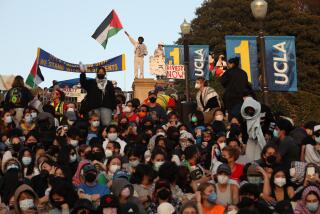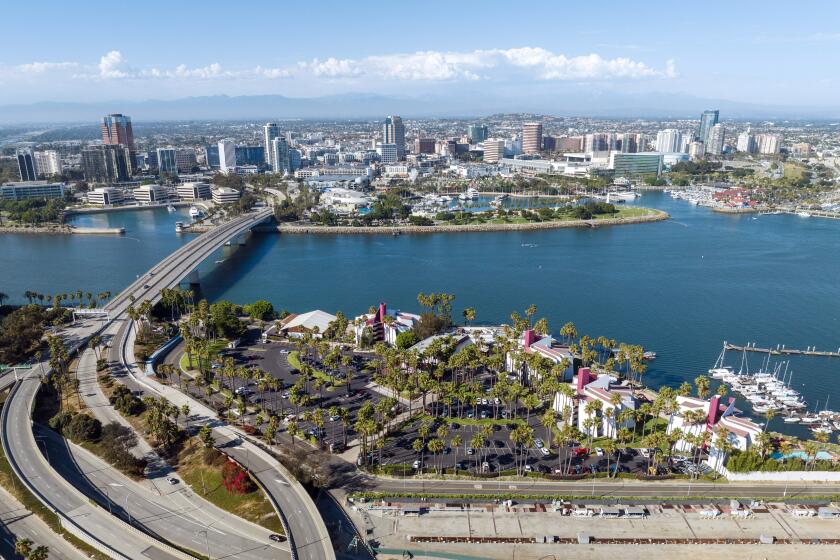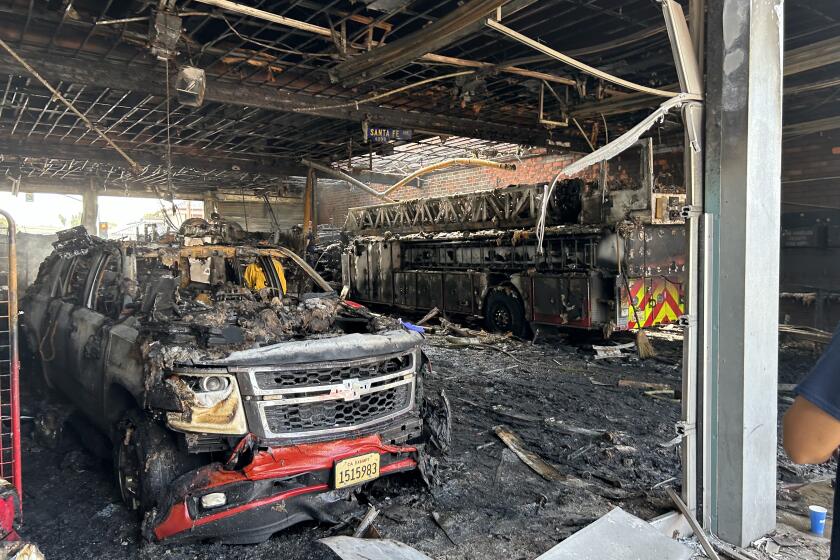Neighborhood Councils Push for More Clout
With a mixture of enthusiasm and some frustration, about 1,000 members of Los Angeles’ burgeoning system of advisory neighborhood councils met Saturday for their twice-yearly congress, where much of the talk was about a campaign to boost their clout at City Hall.
Mayor James K. Hahn announced at the Congress of Neighborhoods that the city budget he will release April 18 will add $2 million to the $6.2 million provided this year for the advisory councils.
The new money is to cover an expansion of the system from 66 to 100 neighborhood councils throughout Los Angeles by June 2004, when officials believe the entire city will be covered.
“One year ago I asked you to partner with me to work on making Los Angeles a better city, neighborhood by neighborhood,” Hahn told the community activists. “That’s what you’ve been doing. You’ve done a tremendous job working together -- to really make the neighborhood council movement real.”
Hahn has agreed to give each neighborhood council $50,000 per year to pay for operational expenses and local improvement projects. The budget for that effort is being increased from $2 million this year to $3 million next year to handle the growth in the number of councils. The neighborhood council system was approved by voters in 1999 as a way to address public disenchantment with city government that was manifested in efforts by the San Fernando Valley and Hollywood to break away from Los Angeles.
Voters rejected the secession measures last year, after Hahn asked them to give a chance to a new charter that allows each area of the city to elect a local neighborhood council. The councils are to advise City Council members.
Saturday’s event at the Los Angeles Convention Center allowed members of the newly formed advisory councils to attend workshops on organizing and navigating the City Hall bureaucracy to get local problems solved.
However, a lot of discussion focused on organizing the neighborhood councils into a citywide voting congress that would make recommendations on issues affecting all of Los Angeles, potentially increasing the influence of the scattered councils.
Ideas being discussed include having each neighborhood council send one representative to a voting congress, or having one person from every three neighborhood councils, so the citywide congress would be small enough to act efficiently.
“One of the things envisioned is that, if they can find an issue they all agree on, like we need more police officers, or more parks or a bond measure for streets, they can come together and make a recommendation,” said Greg Nelson, general manager of the city Department of Neighborhood Empowerment. “It’s going to provide the City Council with a citywide voice, which they have never had before.”
Bennett Kayser, a leader of the neighborhood council system, said the City Council should not feel its power is threatened by the idea of a citywide voting congress because the council would retain sole power to enact any suggestions.
“I think it would help them,” said Kayser, vice president of the Greater Echo Park/Elysian Neighborhood Council.
Indeed, City Councilman Eric Garcetti, one of six council members who attended Saturday’s meeting, agreed that a citywide voting congress is a logical next step. “I think it would be great. We could actually get citywide advice from that kind of group. It’s what democracy is all about,” Garcetti said.
Kayser and other backers of the idea began signing people up Saturday for a citywide issues committee to begin identifying matters on which the councils can provide input.
The proposal was welcomed by some neighborhood activists. They voiced frustration Saturday that the city has made it difficult for the councils to get certified and that, once established, the panels have only advisory power. The activists want some local decision-making power over issues, such as whether to allow a liquor store to open.
“That’s a big frustration,” said Prudy Schultz, a Van Nuys activist. She said the election of the Van Nuys Neighborhood Council has been challenged by some community leaders who feel it was stacked and not representative of the broader community.
So far only 42 of the councils have held elections, allowing them to begin making recommendations.
Tom Gibbons said his Mid-Wilshire Neighborhood Council has been trying for more than two years to get city certification and is running into “convoluted procedures” by the city and a dispute over which neighborhoods should be involved.
“It’s a hassle to get ourselves accredited,” he said.
Kayser said another problem is that an early warning system set up to notify neighborhood councils of important issues at City Hall “is not working well,” leaving the councils to learn about the issues too late to have an effect.
Still, many said they are enthusiastic that the relatively new system will eventually be able to have a strong voice at City Hall.
“The potential is there,” said Sid Gold, a member of the Granada Hills North Neighborhood Council, which has taken public positions including opposition to expansion of Sunshine Canyon Landfill.
A voting citywide congress would increase the clout, Nelson predicted. “It would be an unmovable force. No one could ignore it,” he said.
More to Read
Start your day right
Sign up for Essential California for news, features and recommendations from the L.A. Times and beyond in your inbox six days a week.
You may occasionally receive promotional content from the Los Angeles Times.







